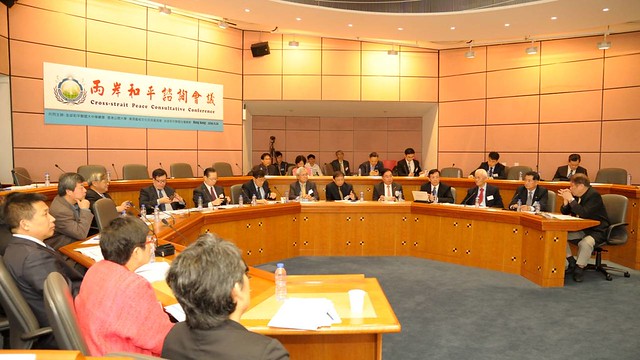Hong Kong, China—On November 26, 2016, UPF-Chinese Region hosted a Cross-Strait Peace Consultation on the theme, “The Future of Cross-Strait Relations: The Way of Cooperation, Sustainable Development and Peace,” at the Open University of Hong Kong (OUHK).
Among the 40 participants were 12 delegates from mainland China; 11 delegates from Taiwan, including one former government minister and one former legislator; 8 delegates from Macau; 7 delegates from Hong Kong, including a deputy of the National People’s Congress, the national legislature of the People’s Republic of China, and a current legislator; as well as representatives from academia, the media and civil society.
The opening remarks were given by Prof. Kin-Chung Ho, dean of the OUHK’s School of Science & Technology, who was representing the president of the university, and who also served as the moderator of the conference. The welcoming remarks and VIP remarks were given by Mr. Ker-shung Lee, president of UPF-Chinese Region, and Mr. Bo Zhao, vice president of the Chinese Culture Development Promotion Association, respectively.
Keynote speeches were given by Prof. Yuk-Shan Wong, president of the OUHK, which was read by Prof. Ho; Dr. King-yuh Chang, former minister of the Mainland Affairs Council of the Executive Yuan, the executive branch of the central government of Taiwan; and Prof. Ying-jin Wang, director of the Research Center for Cross-Strait Relations at Renmin University of China.
The conference also featured four sessions, covering different contemporary cross-strait challenges:
- Session I: “Facing the Critical Challenge: Climate & Environment Change”
- Session II: “Territorial Disputes in the South China Sea”
- Session III: “Fishery Cooperation, Marine Ecological Protection Cooperation, Marine Resources Maintenance and Development Management”
- Session IV: “Cross-Strait Tourism Safety”
Each session began with brief remarks by the panel of speakers for the session, and was followed by a discussion involving all the participants.
The participants said the conference offered a valuable opportunity to engage with and hear from different stakeholders involved in the issues. It was noted that different stakeholders often assume each other’s points of views; however, by directly discussing the issues with one another, they could understand each other more clearly.
The program concluded with a dinner banquet, where the participants shared with one another—and even sang a few songs together.

